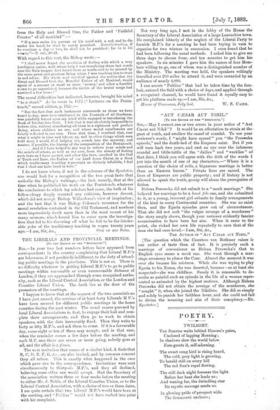"ALIT CZESAR AUT NIHIL."
[To THE EDITOR OF THE "SPECTATOR?') Sin,—May I correct one or two errors in your notice of "Ant Coesar aut Nihil" ? It would be an affectation to strain at the- gnat of truth, and swallow the camel of scandal. To use your reviewer's words, I "might have spared" you "the Perowska episode," and the death-bed of the Empress saint. But if you will turn back two years, and cast an eye over the infamous scandal and tittle-tattle of the "dailies" and " weeklies " of - that date, I think you will agree with the drift of the words I put into the mouth of one of my characters,—" Where it is a question of the choice of evils, a bigamous marriage is better- than an Eastern harem." Private lives are sacred. The lives of Emperors are public property ; and if history is not allowed to speak the truth, gossip will abuse the prerogative of fiction.
Helena Perowska did not submit to a "mock marriage." She believed her marriage to be a bond fide one, and she submitted to it, as a young, innocent girl submits to family arrangements of the kind in many Continental countries. She was no saint then, and the Egeria episodes grew out of circumstances. That she did not seek "the vulgar revenge of a murderess the story amply shows, though your reviewer evidently fancies assassination to have been her aim. When it came to the point, she risked her own life repeatedly to save that of the man she had once loved.—Iam, Sir, &c., THE AUTHOR OF " AUT CESAR AUT
[The question which the Countess von Bothmer raises is one rather of taste than of fact. It is precisely such a marriage of convenience as Helena Perowska's that to- English eyes seems a mock one. She went through a mar- riage ceremony to please the Czar. Almost the moment it was over she became his mistress. While she was trying to play Egeria to his Numa, she was deserted, because—so at least she suspected—she was childless. Surely it is reasonable to de- scribe as painful such an episode in the life of a woman repre- sented as animated by the highest motives. Although Helena Perowska did not obtain the revebge of the murderess, she " sought " it, when she joined the Nihilists. She did so simply and solely to punish her faithless lover, and she could not fait to divine the meaning and aim of their conspiracy.—En- Spectator.]


































 Previous page
Previous page